
In the past two months, the Nyanga branch has had the pleasure of hosting Lindsay Vogelzang; a research student from the Netherlands. In her first couple of days at the branch, the learners were surprised to see the unfamiliar face at the office. In just a few days, they were greeting each other like old friends. It has been an absolute pleasure to work with Lindsay. Over this short period she has become part of the Nyanga branch and a friendly face around the Zolani Centre. She was often heard greeting passersby by in IsiXhosa. The toddlers from the neighbouring educare centre were always surprised and enthused to hear her greet them with ‘Molo’ (Hello). Although her research was conducted mainly with the learners and tutors, we as staff also got to know her well during this period. We are grateful for the helping hand she always offered and we will surely miss her friendly smile.
On Friday, 31 March, Lindsay hosted a farewell session for the learners who participated in her research during her stay at the Nyanga branch. The session was in the form of a surprise pancake party for the learners. The group spent time listening to music, nibbling on snacks and enjoying home-made pancakes made by Lindsay. We as branch staff also took this time to present her with a small gift from the Nyanga branch; an IY hoodie and diary. She has earned it as an “honorary staff member”.
The volunteers she worked with had the following to say about their experience with Lindsay:
“So – working with Lindsay was at first a bit of a challenge for me because I have never encountered someone with so much energy, especially around people that she’s just met. As time passed and the more time I spent with her, I realized that she just generally has a positive attitude and a mindset that exudes nothing but intelligence and positive energy in every space that she’s in. I loved getting to know more about her adventurous mindset and how she finds our country as an interesting and fun place to be in. I also enjoyed telling her my story and sharing my experiences as a South African citizen. One of the things that I have learnt from her is the importance of listening attentively and to not judge the other people’s backgrounds, but rather to encourage them to become bigger and better in the future.“
Sisonke Madlongwana
“Today our Nyanga team is becoming smaller. We will miss your sense of humour and your humble soul. I had a great time working with you and I learnt a lot from you in this short time. May all your dreams come true!”
Sihle Sosanti
“From my experience working with Lindsay, I would say she is a lovely, humble and good to work with kind of person. She is dedicated and ambitious, and I’ve learnt a lot from working with her. I am now proud to say there’s something I know about her country, and I appreciate her enthusiasm and trust towards me. I wish her well on her journey and all the success in her future endeavors. I’d like to tell her that she will be always be welcome and our doors will always be open for her. “
Ayanda Kondlo
We asked Lindsay to say a few words about her research and her short journey with IkamvaYouth:
“Hi there! This is Lindsay, I am a student from the Netherlands and I had the pleasure and honour to join the Nyanga branch for a period of 8 weeks. What am I doing exactly? I have to conduct research for my studies in Cultural Anthropology in order to graduate. The topic of my study is about the youth in the townships of Cape Town; the way they live their lives and how they identify with South Africa. To be at the Nyanga branch I got the opportunity to get to know the staff, tutors and learners for a longer period of time. I listened to their stories during interviews and did group activities to gain an in-depth view of their lives and neighbourhoods. As I said, it was a great honour and pleasure to meet all the different and inspiring people, listen to their stories and experience their way of life. They were really welcoming, and the family vibes are all over the branch. They take care of each other and help each other succeed with education as the key for a brighter future.“
Lindsay has generously donated 14 English dictionaries to the Nyanga branch. We are incredibly grateful for this gift. This gift means a lot to the Nyanga branch and will definitely be a closely cherished asset. We know that our learners and tutors will put them to good use.
The Nyanga branch wishes her all the best with her studies, we hope she enjoyed her stay with us as much as we all did. We would like to thank her once again for the generous donation. We would like to send her off with the following quote:
“Be not afraid of life. Believe that life is worth living, and your belief will help create the fact.”
William James

[Lindsay with the 2017 Nyanga Branch Committee at the Nyanga SPW]
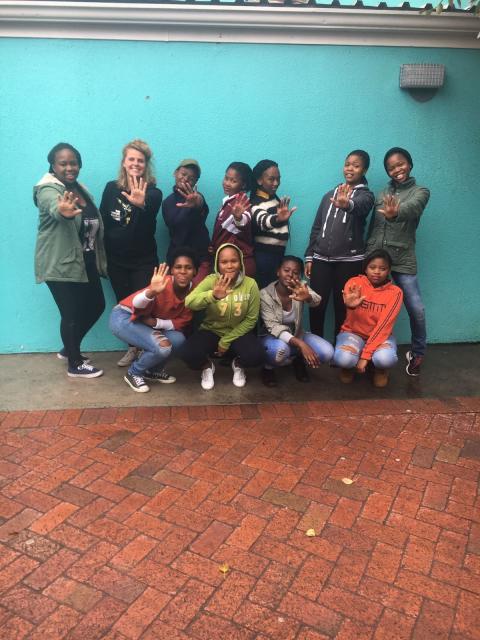
[Lindsay and her learners after the Pancake Party]
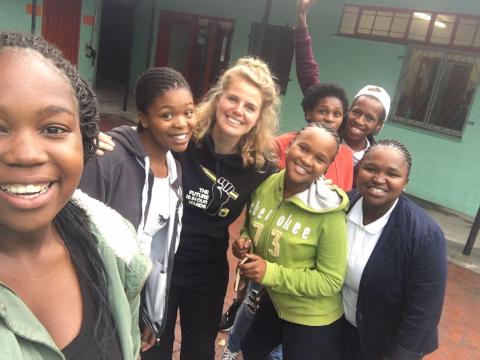
[Lindsay pictured with Nyanga learners and tutors]
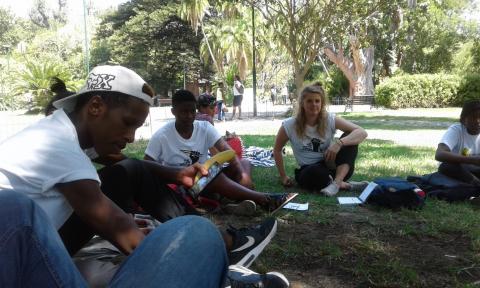
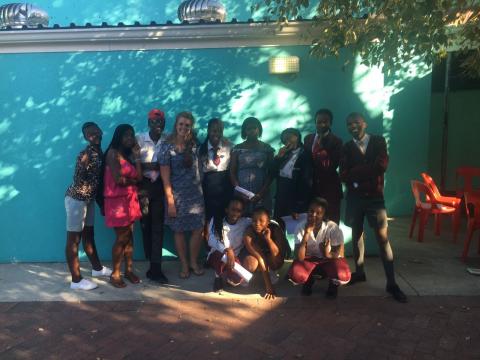
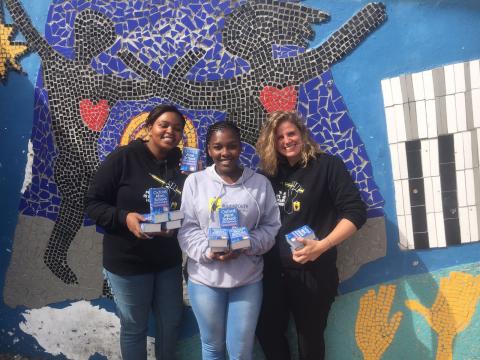
[Nyanga Branch staff members and Lindsay]

IkamvaYouth has started the year with a flurry of training activities. So far we have trained:
• 43 Branch and Programme Coordinators in Facilitating Learning Methodologies
• 8 Branch and Programme Coordinators in Meaningful Mentoring in Gauteng;
• 88 tutors in Western Cape (from 5 IkamvaYouth branches, and 6 partner organisations); and
• 92 tutors in Gauteng from 14 organisations (21 Wits, 37 IY Tutor Training, 34 Partner Tutor Training)
This is just the start to strengthening our vision!
The year ahead will be packed with exciting workshops and short courses, such as:

To view the 2017 training schedule and course outlines got to: http://www.ikamvayouthzone.org/resource/
Please note that the dates are subject to change, so please contact us to confirm dates.
If you have any ideas of training that you, your tutors, or learners need, get in touch with Pepe or Zoe at
pepe@ikamvayouth.org (062 097 2805) or zoe@ikamvayouth.org (074 476 7965) respectively.
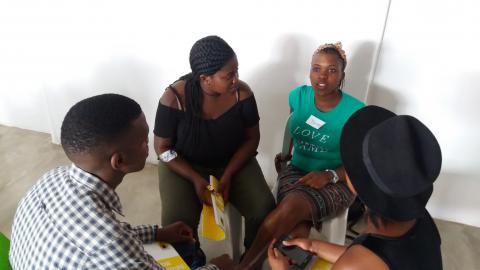
We are whole-heartedly committed to impact in the after-school sector. We aim to increase the
reach of our activities so that more learners have access to high quality tutoring programmes.
This necessitates the deepening of our impact and ensuring that all interactions that IkamvaYouth,
our partners and the growing numbers of dedicated tutors have with the learners are rich, meaningful
and inspiring.
We should constantly ask ourselves: ‘Are we doing the best that we can for our learners?’
It is through questioning and being open to learning that we can adapt to the real needs of the people
that we serve and ultimately have the lasting impact that we seek.
Achieving Vision 2030 is only possible with this mind-set of evolution and growth!
You are welcome to come and learn with us!
Please join us in our quest to bring learners out of poverty!

IkamvaYouth Gauteng branches participated in the Global Mentorship Walk that took place at the Voortrekker Monument Park in Tshwane to commemorate International Women’s day on Saturday the 11th of March 2017. The mentorship walk brought together girls and women from the region, including 11 Grade 12s from Mamelodi branch, 8 from Grade 12s from Ivory Park and 8 Grade 12s from Ebony Park.
The walk was coordinated by Hadithi Media as local organisers of this global initiative, a Vital Voices Global Mentoring Walk. This initiative comprised 132 walks which took place in 61 Countries around the world. The intention was to create an accessible platform for dialogue between mentor and mentee, whilst creating visibility around women leadership and mentorship, with the theme: Her Story, Your Story, Shared Stories. Importantly this day served to motivate women of different ages to voice their stories through writing and taking visuals of of their stories.

The day started at 8am, with registration and breakfast. Rehema Isa gave an overview of their organisation and why it is important for them to host such an event and what is the desired outcome they are looking for at the end of the programme. Rehema Isa further introduced the stakeholders and the roles they played towards making that day a success. Stakeholders that took part in the event were the US Embassy,The Passionate Professionals, Thadithi media as well as IkamvaYouth.Mamelodi intern Naledi was given an opportunity to explain what IkamvaYouth is and give a brief background about our organisation and why I think the event is relevant to our organisation.
Our Mamelodi branch intern, Naledi said “one of the things that stood out for me was that the event turned out well in terms of the interaction between learners and mentors as they all understood how the program and the purpose was. There was a paradigm shift as women of different generations established good relationships . The walk was quite fun as we had different topics to discuss amongst our pairs and shared some of our experiences and ambitions in life like how to tackle some of the obstacles that some of the mentors had gone through and how they made it work for them even if they were experiencing some challenges; this was one of the activities that were quite motivating because you got to realize that people had faced the same challenges you had and you needn’t be be hard on yourself, instead you should stay on course and keep your eye on the ball. We were grouped into teams of 3 which consisted of one mentor and two mentees. Amongst the topics that we discussed were academics; our well-being; how we cope under pressure; where we see ourselves in the future and what we expect from our mentors.”



Towards the end of the programme a collective feedback session in the respective teams was conducted and the teams were also given the opportunity to shoot videos that will be posted on social media and their website talking about their experience about the event.
The objectives of raising awareness about mentoring as a key tool for personal, professional and business development were achieved and the event brought together women professionals and emerging women in mentoring partnerships, creating a lasting network of role models for the mentees.
The benefits of women’s mentorship are numerous. It establishes camaraderie; creates gender-friendly environments; promotes a stronger environment for women’s success and expands horizons for further personal growth as women explore innovative leadership strategies.
IkamvaYouth’s mentoring programme enables Grade 12 learners to access post-school opportunities. Although the career guidance workshops increase learners’ awareness of post-school opportunities and ways to access them, IkamvaYouth learners need one-on-one support from a mentor to help them make the transition from secondary to tertiary education. The mentoring programme ensures that every Ikamvanite accesses tertiary education and/or employment once they matriculate.
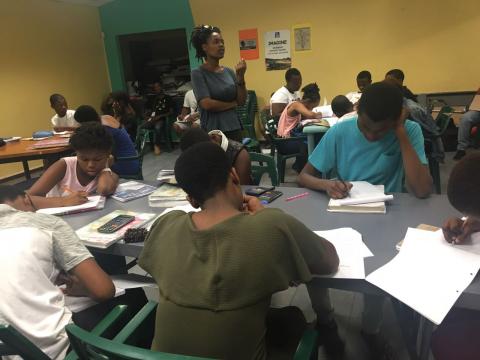

Slindile Msweli from Runway addressing the learners
Waking up in the morning and looking forward to going to the workplace, are one of the key characteristics of a person who has chosen the correct career path in which they can flourish. These are the kind of discussions that took place within our Umlazi Branch on Saturday.
Our grade 10, 11 & 12s had the opportunity to take part in a workshop which covered all the topics that one would have to consider when choosing a desired career path. The learners put pen to paper and thought about what their personal visions and goals are, an exercise they were quite receptive to.
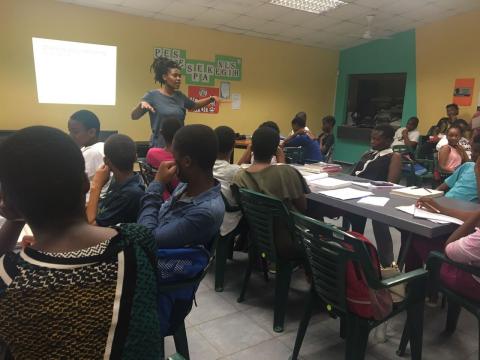
Learners writing down their top 3 goals
Passionate about the development and encouragement of young people from previously disadvantaged backgrounds, the workshop facilitator, Slindile Msweli from Runway, shared information on the kinds of careers that are available to them as well as the various ways in which they can pursue them.
In addition to this, she stressed that learners have a huge part to play when it comes to career selection – this involves researching what they want to study as well as ‘matching’ it to their individual passions, future aspirations as well as their desire to have a job.
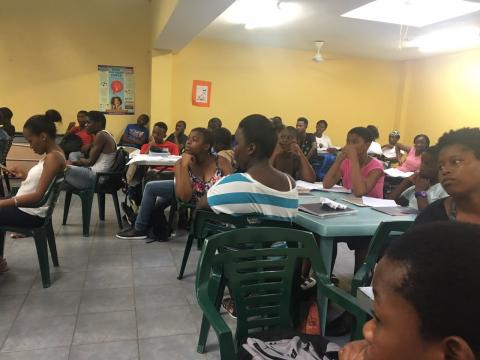
Thembeka Thusi, a grade 10 learner, said that she did not know how important her career choice is and how much influence she has on it even in her current Grade. Thembeka also mentioned that she was grateful to learn about using the internet and social media responsibly as it could affect her career opportunities in future.
Another grade 11 learner, Menzi Jaca, said that his dream is to be a doctor and he knew that his subjects had to be pure maths and physical science. Now understands that the reason why he has to work hard to pass in school is so that he can get the required points to gain entry into his course at university.
In closing the workshop, our Umlazi Ikamvanites got to understand that under-preparation for university and lack of insight when choosing the right career path, resulted in a lot of dropouts and also an increased national rate of unemployment.
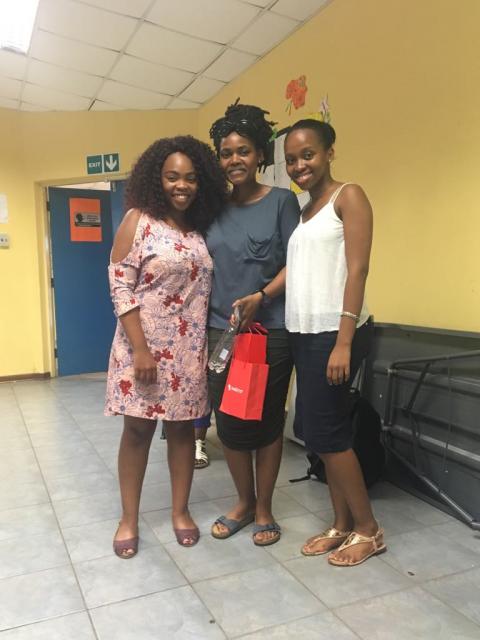
Umlazi Branch Coordinator and Branch Assistant handing over a thank you gift to Slindile Msweli
We at IkamvaYouth are grateful to be one of the key instruments within our respective township communities, that ensure and promote the individual preparation of our learners for university through our various programmes that in turn make a great mark on the country as a whole. We look forward to working with RUNWAY in the near future.
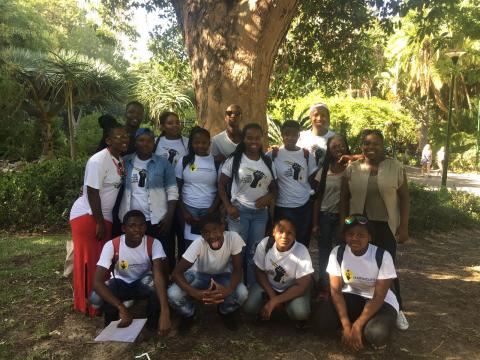
On Saturday the 11th of March, the Nyanga branch had a strategic planning day. The aim of this day was to plan for the year. The event was attended by the newly elected and eager Branch Committee. The group of learners, tutors and staff travelled to the Cape Town Company’s Gardens for the day. The idea was to have a relaxed picnic-style planning day out in the sun.
In true Ikamvanite style, the day started off with an ice-breaker. The agenda for the day included explaining the purpose of the Branch Committee; going through the Nyanga branch strategic goals for 2017; strategic planning for 2017 and assigning roles and responsibilities. The group was split into two in order to draft a monthly plan of branch events for the duration of 2017. The groups then came together to merge their calendars, this calendar will be used by the branch for the duration of the year.
After a full afternoon of planning, the group headed out to a ‘secret’ location for a late lunch. It was a great way to end off the day.
The Nyanga branch looks forward to all the great events we have planned for 2017!

[Nyanga Branch Committee 2017]
[Strategic Planning in action]
[Strategic Planning in action]
[The Branch Committee enjoys lunch]
















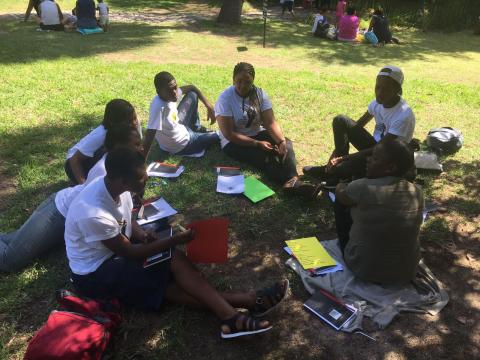
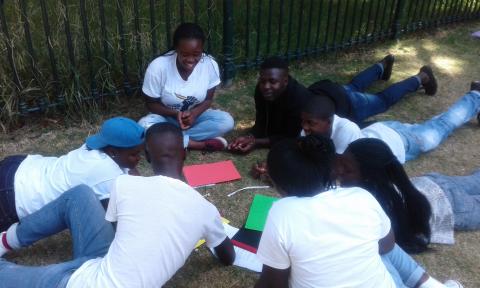
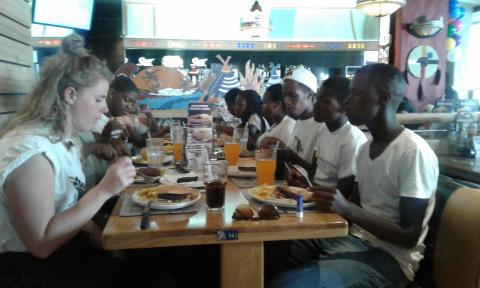
 Lloyd Lungu
Lloyd Lungu